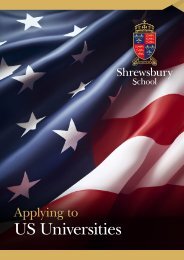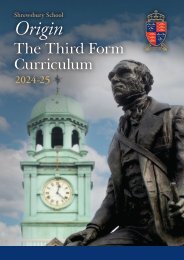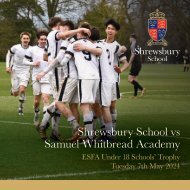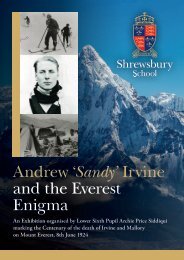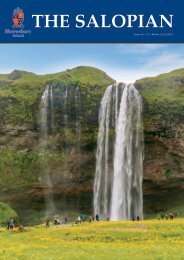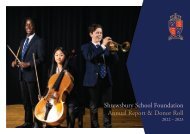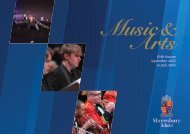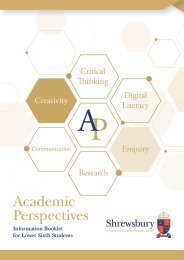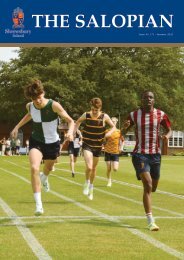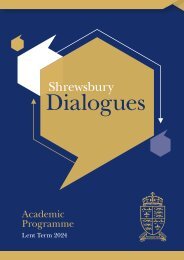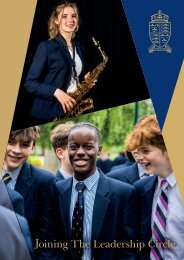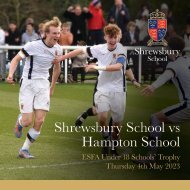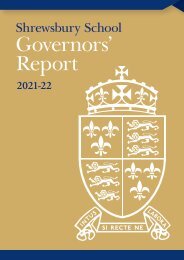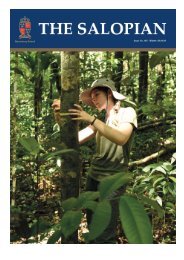Third Form Curriculum 2023-2024
- No tags were found...
Create successful ePaper yourself
Turn your PDF publications into a flip-book with our unique Google optimized e-Paper software.
English<br />
English plays a pivotal role in the Origin curriculum; our aim is<br />
to support and develop the learning of other subjects through the<br />
consolidation and development of the technical skills of reading<br />
and writing, as well as encouraging students to begin to study<br />
literature more independently.<br />
Pupils follow a comprehensive language syllabus,<br />
focusing on spelling, punctuation and grammar,<br />
with cross-curricular input from other faculties.<br />
Each term is devoted to the study of a different<br />
form of literature, beginning with a prose text<br />
in the Michaelmas Term. Novels taught range<br />
from classic texts, such as Charles Dickens’ Hard<br />
Times, to more contemporary works, such as<br />
Philip Pullman’s Northern Lights. The Lent Term<br />
is devoted to the study of Shakespeare; our aim<br />
is to encourage pupils to develop confidence in<br />
exploring Shakespeare’s language, as well as an<br />
appreciation for his skill and power as a dramatist.<br />
Pupils are also invited to explore the context in<br />
which the plays were written. This leads neatly<br />
into the study of an anthology of poetry in the<br />
Summer Term, often focusing on a particular<br />
theme, for example: War or Relationships. A range<br />
of oral and written assignments are produced on<br />
all literary texts, during the year - with at least one<br />
substantive piece of writing on each.<br />
Unsurprisingly, we believe that reading is central<br />
to pupils’ progress in all areas of the curriculum.<br />
All <strong>Third</strong> <strong>Form</strong> pupils have a weekly slot devoted<br />
to individual reading, during their English lessons.<br />
The Faculty works closely with the Moser Library<br />
to establish and promote the value and enjoyment<br />
of reading amongst <strong>Third</strong> <strong>Form</strong> students. There<br />
are also opportunities for Creative Writing, Public<br />
Speaking and Debating.<br />
The Origin English programme endeavours<br />
to produce pupils who are ready to tackle the<br />
demands of the GCSE Language and Literature<br />
courses with confidence and enthusiasm.<br />
Sciences<br />
Biology<br />
Most children grow up with innate fascination<br />
for science: particularly for wildlife, and for the<br />
human body. Children are also growing up in a<br />
society in which Biological Sciences are ever more<br />
relevant: hardly a day goes by without headlines<br />
being made in fields like health, genetics and<br />
environment that can affect our future wellbeing<br />
or shed new light on our origins.<br />
It is the aim of this Faculty to nurture our pupils’<br />
existing interest in Biology through varied,<br />
fun, interactive and practical teaching and to<br />
inspire them to see the continued importance of<br />
Biology in their own lives and the wider world.<br />
Investigative skills and an appreciation for the<br />
scientific method are developed from day one:<br />
we need to train a new generation of scientists<br />
able to ask, and answer their own, new questions.<br />
Studying Biology also helps to develop both<br />
numeracy and literacy and can provide the<br />
analytical skills and technical understanding that<br />
can open doors to many fulfilling and meaningful<br />
careers, and we try wherever possible to refer to<br />
real world applications of biological theory - for<br />
example in biotechnology.<br />
Chemistry<br />
The principles of Chemistry underpin our<br />
understanding of the world around us and are<br />
relevant to all areas of science, from the chemical<br />
processes in living organisms to the formation<br />
of stars millions of miles away. Chemistry is a<br />
vertical subject and so the Origin course starts with<br />
the basics. Atoms are the building blocks of the<br />
Universe and we study their structure: how they<br />
bond to other atoms, how they are arranged in<br />
different materials and then finally how we come to<br />
classify them in the Periodic Table of Elements. We<br />
go on to look at the reactivity of metals, how acids<br />
behave, what alkalis are and how, when the two are<br />
combined, they form salts.<br />
There is a great deal of practical work in the Origin<br />
course, with students carrying out experiments<br />
weekly. The early practicals cover separation of<br />
mixtures and investigating solubility of different<br />
salts in water. There is a certain amount of<br />
deliberate crossover with Maths and English as<br />
students learn to process data and write up their<br />
investigations. They also learn how to produce<br />
hydrogen (authenticated by a small explosion),<br />
carbon dioxide and oxygen before investigating<br />
the relative reactivities of metals with acids and<br />
water. All this helps to improve their dexterity<br />
with equipment and understanding of scientific<br />
methodology.<br />
Physics<br />
Physics attempts to describe how nature works<br />
using the language of mathematics. It suits<br />
those fascinated by how things work, by asking<br />
fundamental questions about the way the<br />
world is, and by the exactness of science which<br />
alone tries to uncover truths about the world.<br />
The foundations are laid from the start, with<br />
pupils mastering calculation skills, including<br />
manipulation of equations and correct writing of<br />
units and appropriate levels of resolution. There is<br />
considerable scope for practical work and pupils<br />
engage in laboratory work early on, investigating<br />
the laws of motion using toy cars and data-logging<br />
software.<br />
Other topics in the Origin course include<br />
Astrophysics, which introduces the concept<br />
of gravity and explores the life cycles of stars,<br />
and Energy, which leads to investigations into<br />
renewable and non-renewable resources. These<br />
topics are all fundamental in the study of Physics<br />
and students go onto apply these concepts with<br />
more complexity in later years.<br />
12<br />
13



